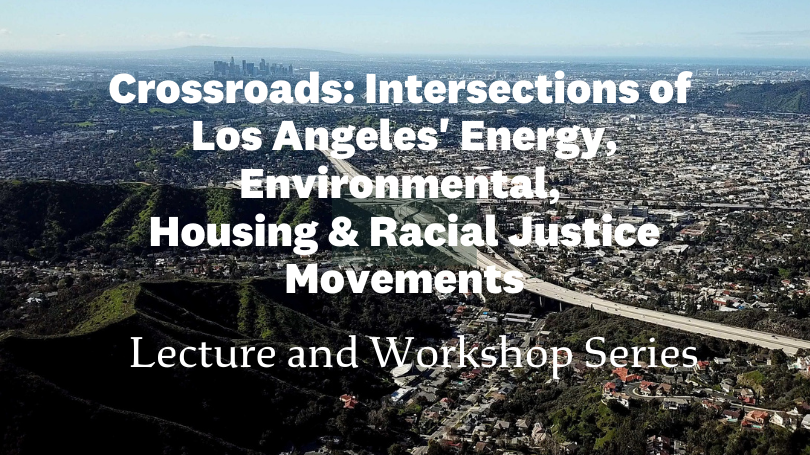
- About
- Education
- Research
- Thought Leadership
- Engagement
- News & Events
Back to Top Nav
Back to Top Nav
Back to Top Nav
Back to Top Nav
Back to Top Nav
From March 30 - April 29, 2021, a coalition of Dartmouth organizations hosted a series, Crossroads: Intersections of Los Angeles' Energy, Environmental, Housing & Racial Justice Movements, which brought a variety of guest speakers to discuss the connections between the energy, environmental, housing, policing, and carceral landscapes in Los Angeles. The workshop and lecture series was sponsored by the Irving Institute, the Sustainability Office, the Office for Institutional Diversity and Equity, and the Department of African and African American Studies, with support from the Departments of Environmental Studies, Geography, and Sociology, and the Nelson A. Rockefeller Center for Public Policy and the Social Sciences. What follows is a reflection on the event by Crossroads project interns Sereena Knight '24 and Jimena Perez '23.
_____________________
When our team met for the first time in December 2020 to discuss the Crossroads series, we knew that we wanted it to be more than a series of lectures. We wanted an immersive, collaborative educational journey. With this idea in mind, we sought out guidance and support from academic departments and community/student organizations at the College. We had many conversations with faculty and staff that helped to guide the direction of our project. We are grateful to have gained many supporters, co-sponsors, and allies in this journey, including our primary sponsors: the Dartmouth Sustainability Office, the Office for Institutional Diversity and Equity, the Department of African and African American Studies, and the Irving Institute for Energy and Society.
A primary goal of our series was to make visible the connections between landscapes of housing justice, police brutality, and environmental racism in Los Angeles, California. By presenting these connections, we hoped to help our audience understand the compounding impacts of these issues on communities of color and low-income communities in one major US city. This case study allowed us to present Los Angeles as a microcosm of the larger United States, and showed how these injustices are connected to one another.
The topics that we covered in the Crossroads series are complex and deeply intertwined with a multitude of underlying issues. We wanted to make the foundations of these topics as comprehensible and engaging as possible within the span of a 60-minute presentation or workshop. For this reason, our speaker slate included academics, grassroots activists, lawyers, local government officials, and nonprofit organizations. We included speakers from the Los Angeles area, as well as moderators and discussion leaders from the Upper Valley, who helped to connect these two geographically distant communities.
From the beginning of the series, we were moved by the engagement of our participants, especially their thoughtful questions and sharing of their personal experiences and stories. It demonstrated that our conference was providing an outlet for often uncomfortable, yet necessary, dialogues to take place, dialogues that touched issues of inequality, trauma, oppression, as well as community resistance and freedom dreams. We were equally proud of how the events served as a foundation for many people to connect themselves to local organizations, movements, and even, on an individual level, with each other. Numerous times, our team witnessed the building of coalitions between folks from across the U.S. who viewed their struggles as united, and were actively committed to practicing solidarity with one another.
Although Crossroads has ended, we hope that participants will continue these important conversations about interconnected justice struggles at home and abroad. Event recordings are available on the Crossroads page of the Irving Institute website, along with the descriptions of each event and all speakers. We encourage everyone to continue the work of learning and taking action on environmental/energy racism, housing injustice, and police brutality issues.
Organizing this series was not an easy task, but we hope our project inspires others to plan events that extend beyond what is covered in the college classroom. All of this has become possible with lots of planning, teamwork, and support towards a collective vision for Crossroads, and it is possible for any other passion that you want to visualize. Do not be afraid to dream!